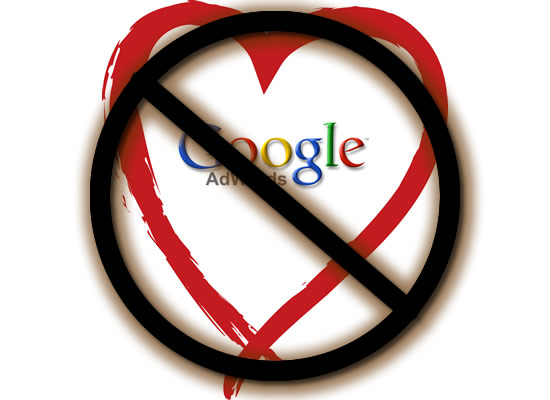3 Big Reasons to Hate Google AdWords
I recently wrote the upbeat “3 Big Reasons to Love Google AdWords“. Well, this post is his depressed little brother.
If you run your own Google AdWords campaign, it’s likely that you’ll sometimes find yourself in the haters’ camp.
Let’s see why.
1) AdWords BURNS through your money
It’s no secret that AdWords can be an expensive ad platform. It’s the largest, most intricate and most competitive online ad platform on the planet. And competition means you need to pay more to get searchers to click on your ads.
Google also makes it easy to waste your money.
I had one client who had set up his own campaign, turned it on for one day, checked it the next day, and found he had spent $650 on 150 clicks. He didn’t generate a single good lead, he was mad as hell, and he then abandoned AdWords for a year until he spoke with me.
I’ve had other clients who were bidding on carefully selected, fairly expensive keywords at $10 – $20 per click. But they had performed little or no optimization and were spending several thousand dollars a month. They were wasting 1/3 of their budget on non-relevant search terms and another 1/3 due to low Adwords quality scores. And they had no idea.
AdWords can be an effective way to drain excess money from a bank account.
But there is a silver lining. If you know what you’re doing you can stop the money burn. You can target better prospects, increase your ad visibility, pay less per click, and achieve greater conversion rates. And you can do all that even in competitive markets.
You can leave your competitors scratching their heads about how you can afford to constantly beat out their ads. Let them burn their money trying to catch up!
2) AdWords requires NEVER-ENDING management
“Winning” with Google AdWords means achieving a positive long-term ROI (Return on Investment).
That ain’t easy.
By some estimates, as many as 80% of AdWords campaigns lose money every month.
If you don’t want to be in that group, you have a lot of work to do. You need to continually:
- test ad copy
- adjust bids
- add negative keywords
- add positive keywords
- split out new ad groups
- test different campaign settings
- test different landing pages
- increase your quality scores
… and that’s just on Monday!
Even when you have a great month you can’t take a breather. Next month searcher behavior might change. New competitors might come on the scene. Other competitors might see what you’re doing and quickly catch up.
Take a month off to head to the Caribbean, and your +30% ROI campaign might turn into a -50% ROI campaign.
What a pain in the a$$!
But there is a silver lining here, too. This continual Google AdWords optimization is really continual marketing messaging optimization in disguise.
You’ll find that what you learn from AdWords will improve all your marketing. It will help you better identify, attract and win new customers across all your marketing channels.
Making AdWords perform better ends up making your business perform better.
The other silver lining, of course, is that you don’t need to do all this work yourself.
3) You don’t know WHO is clicking your AdWords ads
AdWords experts can manage your campaigns. They can reduce wasted spending. They can produce a positive ROI.
But even the experts don’t know who is actually seeing your AdWords ads.
Say whaaaaa?
Google AdWords search advertising is all about “user intent”. A user enters a search term, we guess what they have in mind, and we bid to have our ad shown to them.
But are they actually a good prospect for us based on who they are? We have no idea.
We know the string of characters they entered into the search box. We might also know their location, the day and time they’re searching, and the type of device they’re searching on. But that’s all.
What we do NOT know about these searchers is voluminous:
- age
- sex
- industry
- company
- job title
- income
- family status
- hobbies
- interests
… and the list goes on.
This time I’m not going to give you a silver lining. There is none. Instead I’m going to say that you might want to take a look at Facebook advertising.
Before you say… “Ha! My ideal customer/client would never be looking for me on Facebook!”, let me say that I agree with you!
But that doesn’t matter because Facebook, especially since February 2014, has reinvented “interruption marketing“.
Yes, you still need to catch a prospect’s eye when they’re scrolling through their newsfeed to see what their friends are up to. And they most definitely are not searching for your service at that moment.
But, oh, the targeting!
I’ll write a detailed post about Facebook advertising later. For now let me just say that if you know your target customer persona well, Facebook can be a gold mine.
On Google you can show your ad to people who search for “wealth manager”. On Facebook you can show your ad to people who are age 45-65, own their home, have retirement accounts, earn >$100k, take Caribbean vacations, read Fortune magazine and follow Warren Buffet.
And you target these prospects for far less per click than with Google AdWords.
Wow.
So if you really know who your target customers are, consider Facebook. It’s not just for cat photos anymore.
Conclusion
Love AdWords. Hate AdWords. Either way you’re right.
Just make sure you’re using it for your business… wisely.
Frustrated with your online advertising? Let’s talk.
Or ask a question below.


Very good post! I like that you incorporated Facebook advertising into this post as an alternative to AdWords.
I use both AdWords and Facebook ads for my clients (among other advertising platforms). I find that, generally, AdWords gives me more qualified hits, whereas Facebook gives a higher volume of less qualified hits. For small businesses with a small advertising budget, Facebook is a great starting grounds.
Thanks for providing such a well thought-out article!
Joe
Thanks for the note, Joe. I also find that FB can be effective for selling info products (especially in the under $100 range), while AdWords is generally more effective in capturing higher ticket sales. Different tools, different targeting, different sweet spots.
Andrew